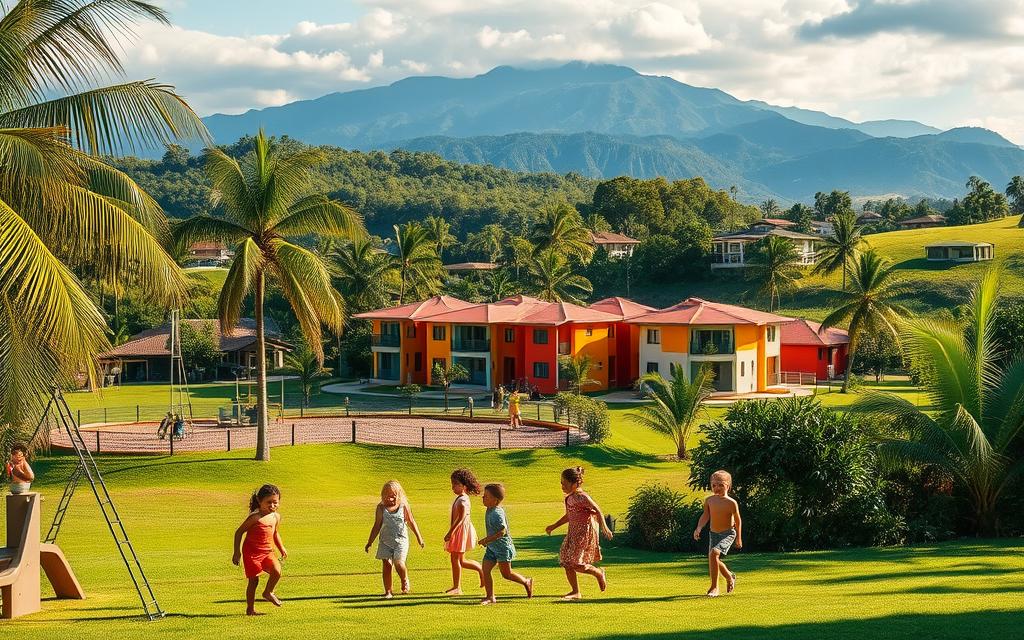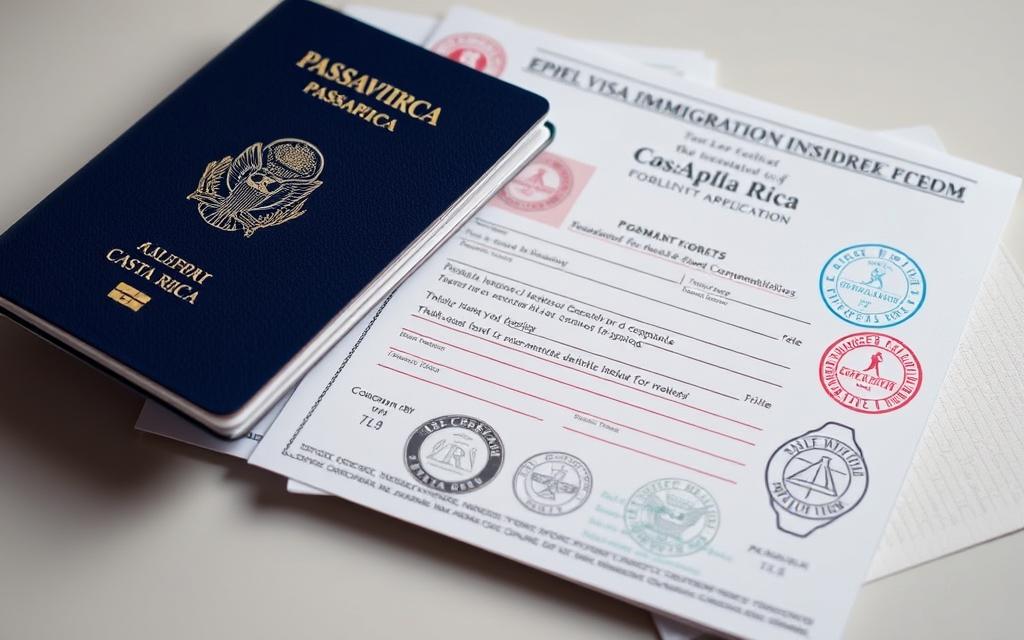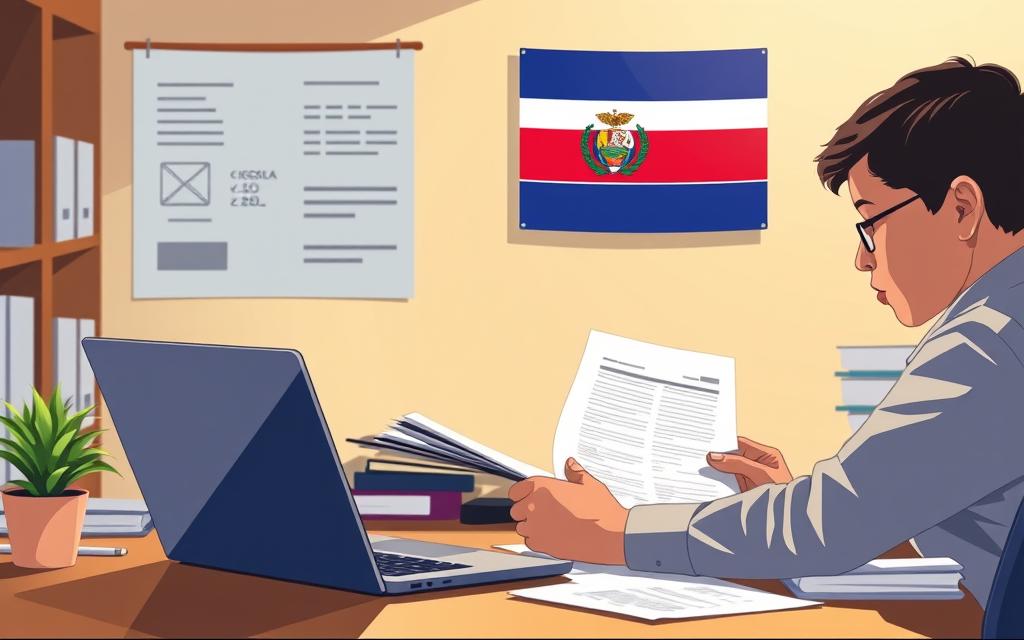Can Children Obtain Costa Rica Residency? Our Expert Guide

Residency in Costa Rica has become an attractive option for families seeking a better quality of life and new opportunities in a diverse and welcoming environment. Costa Rica offers various pathways for individuals and families to settle permanently or temporarily.
Families are drawn to Costa Rica for its safety, stable democratic institutions, and vibrant culture. As part of our expert guide, we'll explore the comprehensive process of obtaining residency for children, addressing the requirements and eligibility criteria for a smooth transition.
Costa Rica's family-friendly immigration policies make it an attractive destination for families. Our guide will walk you through each step of the journey, from initial documentation to final approval, ensuring you have all the information needed for a successful application.
Understanding Residency Options for Families in Costa Rica

With its welcoming environment, Costa Rica provides various pathways to residency for families. Costa Rica's residency programs are designed to accommodate different needs and circumstances, making it an attractive destination for families looking to relocate.
Overview of Costa Rica's Residency Programs
Costa Rica offers a variety of residency options, including rentista residency for those with stable income, investment residency for entrepreneurs, and permanent residency for those who meet specific legal requirements. These programs cater to different family situations, ensuring there's a suitable pathway for most applicants. By choosing the right residency program, families can enjoy a smoother transition to life in Costa Rica.
Benefits of Costa Rican Residency for Families
Families with Costa Rican residency can access the country's renowned national healthcare system, known as CAJA, which provides affordable and high-quality medical services. The education system in Costa Rica also offers excellent opportunities for children, with both public and private schools available. Moreover, residency status provides families with stability and legal rights, including the ability to work and conduct business in the country. For more information on the next steps after obtaining residency, you can visit our guide on post-residency steps.
Residency in Costa Rica also opens up international travel opportunities, with visa-free access to over 150 countries. This makes it easier for families to explore the world together. Furthermore, the stable political environment and strong democratic institutions in Costa Rica create a safe and welcoming atmosphere for families relocating from abroad.
Can Children Get Costa Rica Residency? Eligibility Pathways

Navigating the complexities of Costa Rican residency for children can be challenging, but understanding the eligibility pathways is crucial for families. Costa Rica's immigration policies offer several routes for children to obtain residency, primarily through their parents or by birthright.
Children as Dependents on Parent Applications
Children can be included as dependents on their parents' residency applications. This is a common pathway for families to secure residency together. We recommend visiting our guide on how to get residency in Costa for more detailed information on the application process.
Children Born to Costa Rican Citizens
Children born to Costa Rican citizens are automatically granted Costa Rican nationality, and thus, residency. This birthright is an essential aspect of Costa Rica's immigration policy, promoting family unity.
Age Limitations and Special Considerations
While the standard age limit for dependent children is under 25 years, special considerations are made for children with physical or mental disabilities. In such cases, additional documentation is required to prove dependency status. It's crucial for families to ensure all members have valid tourist visas before starting the application process, as expired visas can negatively impact eligibility.
Required Documentation for Child Residency Applications

To ensure a smooth application process, it's crucial to understand the required documentation for child residency in Costa Rica. The immigration process demands precise and comprehensive documentation to verify the child's identity, nationality, and relationship to the applicants.
Essential Documents and Authentication Process
Several key documents are necessary for a child's residency application. These include a valid passport, birth certificate, and proof of the child's relationship to the primary applicant. All documents must be authenticated to verify their legitimacy. Authentication involves verifying the document's authenticity through the issuing authority or relevant government agency. For instance, a birth certificate may need to be authenticated by the local government or relevant department. We recommend checking with the Costa Rican immigration authorities or consulting the official government website for the most up-to-date information on required documents and authentication procedures.
Translation and Legalization Requirements
All non-Spanish documents must be officially translated into Spanish by a certified translator authorized by the Costa Rican Ministry of Foreign Affairs. The translation process involves converting the document's content into Spanish while maintaining its original meaning and context. For example, if a child's birth certificate is in English, it must be translated into Spanish by an authorized translator. Both the original document and its translation must be submitted together as part of the application package. To learn more about the specific requirements for minors traveling from Costa Rica, you can visit this resource for detailed information.
Step-by-Step Application Process for Children

Navigating the residency application process for children in Costa Rica can be complex, but understanding the steps involved can simplify the journey. We will guide you through the initial application, document submission, processing timeline, and how to stay in Costa Rica during the application period.
Initial Application and Document Submission
The application process begins with gathering and submitting necessary documents. This includes essential documents for the child, which must be authenticated and translated according to Costa Rican requirements.
Processing Timeline and Status Tracking
After submitting the application, the processing timeline typically spans several months. During this time, you can track the status of your application through the immigration authorities.
Staying in Costa Rica During the Application Period
Upon submitting the application, you'll receive a "Hoja trámite," allowing you to legally remain in Costa Rica. However, maintaining a valid tourist visa stamp is necessary for driving privileges. Our immigration team is available to guide you through daily life in Costa Rica while your application is being processed.
Parents Obtaining Residency Through Costa Rican Children

Parents of children who are Costa Rican citizens have a unique opportunity to obtain residency. The "Residency for Parents" category offers several significant advantages compared to other residency options in Costa Rica. We will guide you through the requirements and benefits of this category.
Requirements for the "Residency for Parents" Category
The "Residency for Parents" category grants permanent residency status immediately upon approval, unlike temporary residency categories that require renewals. To qualify, parents must officially register their child's Costa Rican citizenship. Our immigration team can assist with this process, ensuring that all necessary documents are properly submitted. For more information on the citizenship process, you can visit this link.
Benefits and Rights for Parents of Costa Rican Citizens
As a parent with permanent residency, you have the legal right to work in Costa Rica, either as an employee or as an independent contractor. Additional benefits include business ownership, with the ability to receive dividends, and access to the Costa Rican healthcare system (CAJA). There are no minimum stay requirements to maintain your residency status, offering flexibility for international families. This residency category also provides a path to eventual citizenship eligibility, typically after 7 years of permanent residency.
Conclusion: Building Your Family's Future in Costa Rica
As we navigate the complexities of Costa Rican residency, it's clear that families have a unique opportunity to build a stable future. Costa Rica offers a variety of residency options to suit different needs and circumstances, including rentista residency for those with stable income, investment residency for entrepreneurs, and permanent residency for those seeking long-term settlement.
Securing residency in this vibrant nation opens doors to endless opportunities for families and individuals alike. Whether you're exploring temporary residence or aiming for permanent settlement, careful preparation is key to a successful application. Ensuring all documents are verified and legalized is crucial to avoid delays. Partnering with experienced immigration experts can simplify the process, providing clarity and confidence at every step.
Families should consider their long-term goals when selecting the appropriate residency pathway, as different options offer varying benefits and requirements. The Costa Rican residency process for children, whether as dependents or through Costa Rican parentage, creates a foundation for their legal status and future opportunities. For more information on Costa Rican citizenship laws, you can explore our comprehensive guide on dual citizenship laws in Costa Rica.
With careful planning and proper guidance, families can successfully navigate the residency process and begin building their new lives in Costa Rica. The benefits of Costa Rican residency for children include access to quality education, healthcare, and a safe environment conducive to healthy development. We encourage families to begin the application process well in advance of their planned relocation, as thorough preparation is the key to a successful residency journey in Costa Rica.


